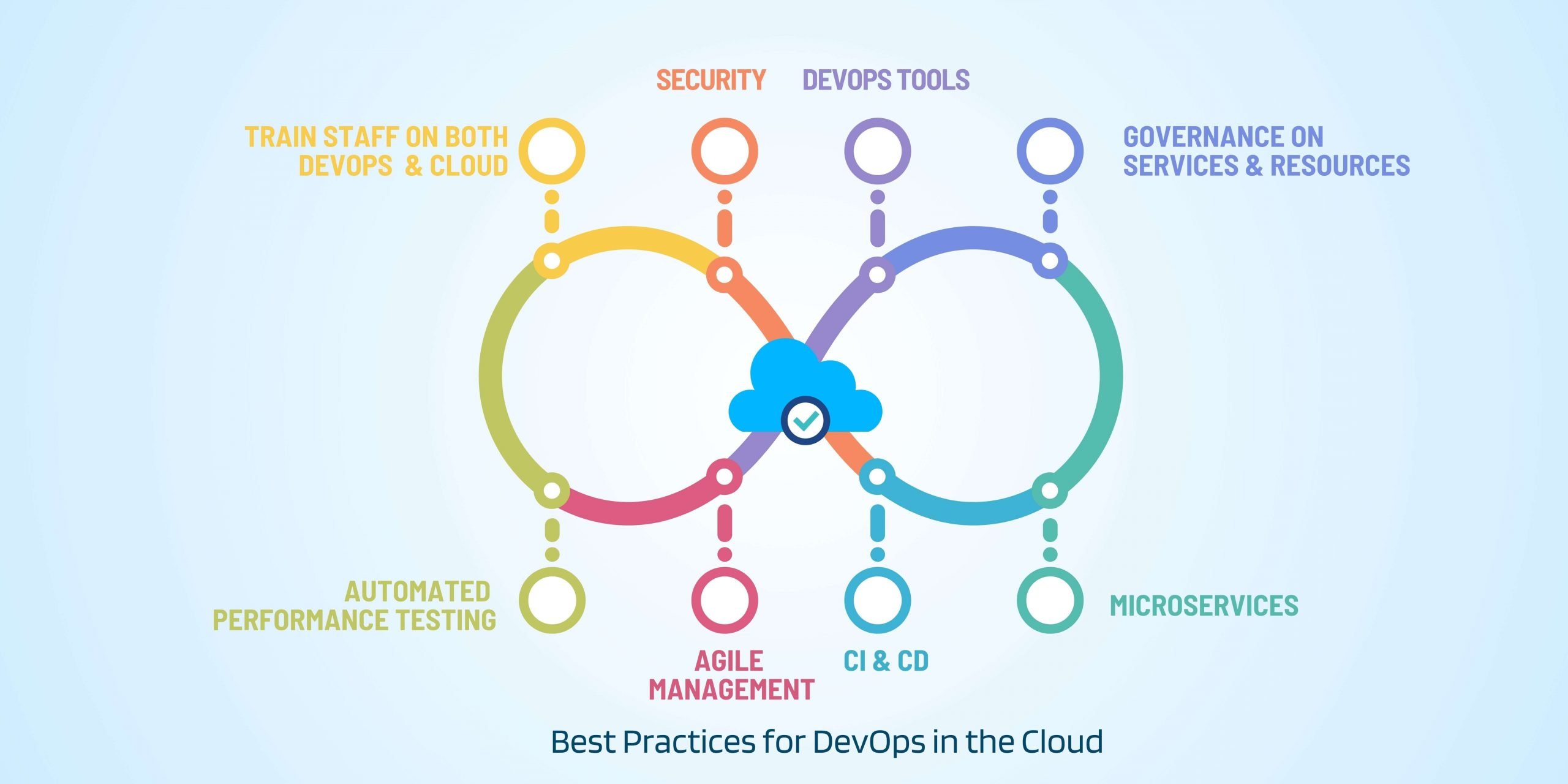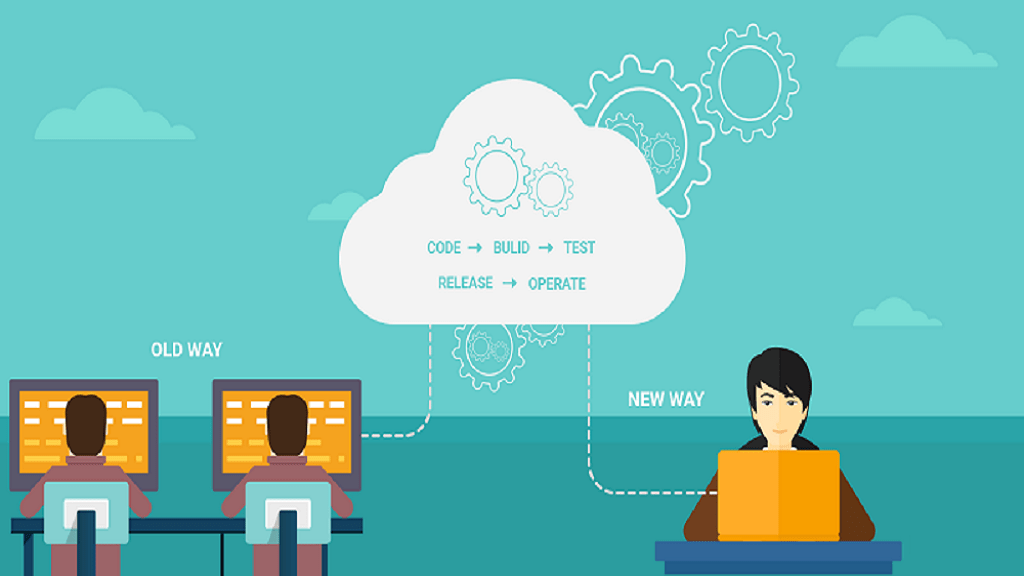Important Practices for DevOps in the Cloud
Here Are The Important Practices for DevOps in the Cloud
Cloud computing and DevOps are two aspects of the technological shift which are completely inseparable. The aim of DevOps is to streamline development so that the requirements of the users can make it into application production while the cloud offers automation to the process of provisioning and scaling so that application changes can be done. The biggest challenge in dealing with the two is that IT professionals practicing DevOps development in the cloud make too many mistakes that are easily avoidable.
The many mistakes that are made are simply because people have not really understood DevOps and the best practices. While both areas have not been completely understood, it is the people’s problems that are a bigger challenge than the actual technological challenges. Here are some of the best practices to adopt for DevOps Development.
1. Train staff on both DevOps Development and Cloud Computing
If you are dealing with issues with the implementation of DevOps Development in the cloud, you are probably fighting a battle that is both cultural and technological. When you train your staff, they get to a place where they understand DevOps development better, which helps them accept the practice. Therefore, take time and approach the key players in your organization, and let them take part in DevOps training, in addition to the training, offer them mentoring and let them know that this is something that they need to learn and why it is important. When it is understood that the process is important and the reasons why your employees will have better attitudes towards the process.
2. Keep security in mind
Another aspect of DevOps that usually ends up being a huge issue is security. Security models change a lot in the cloud, which means that in addition to the regular identity-based security models, you need to extend security to DevOps tools and organizations. Security is supposed to be part of the automated testing and should be built into the continuous integration and deployment processes. If you are able to, hire a professional who will be in charge of security within DevOps in all your cloud applications.
3. Use versatile DevOps tools
Another measure that you can take to improve DevOps practices within the cloud is investing in mobile app development which works with more than one cloud. Most people like simple solutions when working with DevOps tools, and many times, their process includes using a public cloud provider to get the tools that they need. It is a better idea to keep all of your operations locked to a single cloud and then deploy your applications to different cloud platforms so that you can pick whichever public or private cloud works best for your situation.
4. Think about service and resource governance
Another important consideration that you need to make when strategizing as a mobile app developer, is governance. Most people simply assume that they will manage to handle all the services and resources until a point where everything is too tiresome to manage. It is important to note that regardless of the number of services that you are working on, you are likely to reach the tipping point where you will need proper governance of the tools within the first year of using DevOps, therefore, invest in security way long beforehand.
5. Automated performance testing
Another important factor to think about when it comes to being a competent mobile app developer is automated performance testing. Many times, performance issues are usually hidden till a point where you have to go into the actual production. It reflects really badly on your company when the end user ends up being the first person to discover that there are application problems with whatever you have developed. It is therefore important to make sure that before anything goes into production, you have made rigorous tests to ascertain that the performance is up to the required standard.
These are some of the things that you need to make part of your DevOps practices. Whether you handle mobile app development or any other type of application, you will get the best results when you have put in place measures that govern the quality of the production process for you. Therefore, take time and learn about ways in which you can improve the process as this will ultimately improve your products.
6. Agile Project Management:
Agile management is considered the best practice in DevOps when operating in the cloud due to its ability to enhance collaboration, efficiency, and adaptability. In the rapidly evolving world of cloud computing, DevOps teams constantly face the challenge of managing intricate systems and delivering high-quality software at a fast pace.
By leveraging Agile methodologies such as Scrum or Kanban, these teams can prioritize tasks, break them into manageable chunks, and iterate quickly, allowing for continuous improvement and faster time-to-market. The cloud environment lends itself well to Agile management, as it enables easy scalability and flexibility, providing a perfect platform for collaboration, automation, and seamless integration of development, testing, deployment, and monitoring processes.
Ultimately, adopting Agile management practices in DevOps allows teams to embrace the dynamic nature of the cloud, delivering innovative and reliable solutions more efficiently.
7. Continuous Deployment (CD) and continuous Integration for Cloud apps
Continuous Integration (CI) and Continuous Deployment (CD) are highly regarded as best practices in DevOps cloud environments.
CI involves the frequent integration of code changes into a shared repository, ensuring that conflicts and issues are identified early on. This practice allows for a constant feedback loop, allowing developers to identify and rectify any integration problems promptly, leading to more reliable software. CD automates the process of deploying code changes to production environments, ensuring that software releases are smooth, efficient, and standardized.
By implementing CI and CD, teams can achieve shorter development cycles, increased collaboration, and improved quality, ultimately resulting in faster time-to-market and greater customer satisfaction.
8. Microservices
Microservices have emerged as a powerful approach in the field of DevOps, especially in the cloud environment. By breaking down complex applications into smaller, independent components, microservices allow for better scalability, flexibility, and fault tolerance. Each microservice can be developed, deployed, and tested independently, enabling faster and more efficient software development cycles.
Additionally, with the help of containerization technologies like Docker and Kubernetes, these microservices can be easily orchestrated and managed in a cloud environment. This decoupled architecture not only promotes team autonomy and faster time-to-market but also ensures smooth operations, as any faults or failures in one microservice do not impact the entire system. Thus, by adopting microservices as DevOps practices in the cloud, organizations can optimize their software development process, enhance their agility, and deliver high-quality applications to their customers.

Also Read: Understanding the Role of DevOps in Digital Engineering
What are the key benefits of DevOps adoption in the cloud?
DevOps adoption in the cloud has numerous benefits that can greatly enhance an organization’s efficiency, scalability, and reliability. One of the key benefits is increased speed and agility. The cloud provides a flexible and scalable infrastructure that enables faster provisioning and deployment of resources.
By adopting DevOps practices in the cloud, organizations can automate their development and deployment processes, reducing the time taken to deliver new features and updates. This speed allows businesses to quickly respond to changing customer demands, gain a competitive edge, and rapidly innovate.
1. Improved Collaboration:
Another benefit of DevOps adoption in the cloud is improved collaboration and communication. DevOps encourages the collaboration between development, operations, and other teams involved in the software development lifecycle.
By leveraging cloud-based collaboration tools and platforms, teams can work together more effectively, break down silos, and share knowledge and feedback. This collaboration leads to better alignment between development and operations teams, resulting in faster troubleshooting, better code quality, reduced errors, and improved overall productivity.
2. Cost efficiency:
Cost efficiency is another advantage of DevOps adoption in the cloud. The cloud offers pay-as-you-go models, where organizations only pay for the resources, they use. By adopting DevOps practices and automating processes in the cloud, organizations can optimize their resource allocation and reduce unnecessary costs.
They can scale their infrastructure up and down as required, ensuring they have the right amount of resources for their workload. This dynamic scalability allows businesses to avoid overprovisioning, eliminate idle resources, and save on infrastructure costs.
3. Reliability and Resilience:
Adopting DevOps in the cloud increases reliability and resilience. The cloud provides built-in redundancy, failover mechanisms, and disaster recovery options. By leveraging these features and implementing automated testing, continuous integration, and continuous deployment practices, organizations can minimize downtime, quickly recover from failures, and ensure the reliability and availability of their systems.
This elevated level of resilience enables businesses to provide uninterrupted services to their customers, build trust, and protect their brand reputation.
By leveraging cloud-based infrastructure and automated practices, organizations can accelerate their development and deployment cycles, optimize resource allocation, collaborate more effectively, and ensure the availability and resilience of their systems. Embracing DevOps in the cloud is a strategic move that empowers organizations to continuously innovate, adapt to market changes, and stay ahead in the competitive landscape.
What are some familiar challenges in DevOps adoption/implementation for cloud projects?
DevOps adoption has become increasingly popular in the realm of cloud computing as it offers numerous benefits such as faster deployment, increased collaboration, and enhanced scalability. However, there are several challenges that cloud professionals commonly face when implementing DevOps practices in their organizations.
1. Resistance to change:
One common challenge is the resistance to change. Many traditional IT teams are accustomed to their established processes and may be reluctant to embrace a new way of working. DevOps requires a cultural shift towards collaboration, automation, and continuous improvement, which can be met with resistance from individuals who prefer the status quo. Overcoming this challenge often requires effective communication and education about the benefits of DevOps and its potential to drive innovation and efficiency.
2. The complexity of managing different cloud environments:
Another challenge is the complexity of managing multiple cloud environments. In a multi-cloud or hybrid cloud environment, different cloud providers may have their own unique tools, APIs, and deployment methodologies. This complexity can make it difficult to establish a consistent DevOps pipeline across all environments. Cloud professionals need to invest time and effort in creating and maintaining standardized processes, tooling, and configurations that can be applied universally across different cloud providers.
3. Security:
Security is also a major concern when adopting DevOps practices in the cloud. As organizations increasingly rely on cloud infrastructure and services, ensuring data privacy and protection becomes crucial. Cloud professionals must implement comprehensive security measures at each stage of the DevOps pipeline, including secure coding practices, vulnerability scanning, access control, and encryption.
Additionally, they need to stay updated with the ever-evolving security threats and implement continuous monitoring and auditing to detect and respond to potential breaches.
4. Lack of skilled personnel:
lack of skilled personnel is a major challenge in DevOps adoption for cloud professionals. DevOps requires a diverse skill set combining technical knowledge, automation expertise, collaboration skills, and business acumen. However, finding professionals with these skills can be challenging, leading to a shortage of qualified individuals in the market. Organizations may need to invest in training their existing workforce, hiring, and retaining talented individuals, or leveraging external partnerships to bridge this skills gap and successfully implement DevOps practices in the cloud.
How to choose the right cloud platform for DevOps?
Choosing the right platform for DevOps can be a critical decision for organizations looking to streamline their software development and delivery processes. The platform you select will serve as the foundation for your DevOps practices, enabling seamless collaboration between development, operations, and other key stakeholders. To choose the right platform for your needs, there are several factors to consider.
It is important to assess your specific requirements and goals. Considerations such as the size of your organization, the complexity of your software projects, and your team’s technical proficiency are all critical factors in determining the type of platform that is best suited for your needs. For instance, if you have a large organization with distributed teams, you may need a platform that supports easy communication and collaboration across various locations. On the other hand, if your team is relatively small and possesses an elevated level of technical expertise, you may opt for a more advanced platform with a wide range of customization options.
It is crucial to evaluate the scalability and flexibility of the platform. Look for platforms that offer extensive integrations, a robust set of features, and the ability to adapt to emerging technologies. Additionally, consider the platform’s ability to support both on-premises and cloud deployments, as this can provide the flexibility needed to deploy and manage your applications across different environments.
You must ensure that the platform aligns with your organization’s culture and values. It is essential to choose a platform that promotes transparency, encourages cross-functional collaboration, and fosters a culture of innovation and learning. Look for platforms that offer features like real-time dashboards, easy reporting and analytics, and clear visibility into the software development and deployment lifecycle.
Also Read: How Cloud Computing Can Help Businesses? A Comprehensive Guide
What are the popular DevOps tools for implementing DevOps in the cloud?
Implementing DevOps in the cloud requires a robust set of tools to automate processes, facilitate collaboration, and ensure continuous integration and delivery. These tools enable organizations to streamline their workflows, improve efficiency, and achieve faster time-to-market. Here is a list of recommended tools for implementing DevOps in the cloud.
1. GIT
GIT is a powerful that allows developers to collaborate and manage their code repositories effectively, ensuring smooth and efficient workflows. With its version control capabilities, GIT enables teams to track changes made to the codebase, making it easier to revert to previous versions if needed.
Additionally, GIT integrates seamlessly with cloud platforms, providing developers with the flexibility to deploy and manage their applications in a scalable and reliable manner. Overall, GIT’s presence in the cloud significantly enhances the productivity and efficiency of DevOps processes, making it an indispensable tool for modern software development teams.
2. Kubernetes
Kubernetes is a powerful open-source container orchestration tool that has become an essential component in the world of cloud computing and DevOps. With its ability to automate the deployment, scaling, and management of containerized applications, Kubernetes simplifies the process of deploying and managing applications in the cloud.
By leveraging Kubernetes, DevOps teams can seamlessly deploy and run their applications across different cloud platforms, ensuring high availability, optimal resource utilization, and easy scalability. Additionally, Kubernetes provides built-in features for load balancing, self-healing, and service discovery, making it an invaluable tool for ensuring the reliability and efficiency of cloud-based applications. Overall, Kubernetes has revolutionized the way DevOps teams handle application deployment and management in the cloud, enabling them to streamline their workflows and rapidly iterate on their applications.
3. Jenkins
Jenkins is a powerful DevOps tool that has become increasingly popular in cloud computing environments. This versatile helps you automating various stages of the software development and deployment process, enabling teams to deliver applications more efficiently and reliably.
By integrating with cloud platforms such as AWS or Google Cloud, Jenkins can seamlessly provision and manage resources, orchestrate continuous integration and delivery pipelines, and monitor the health and performance of applications. With its vast array of plugins and integrations, Jenkins simplifies the complexity of cloud-based DevOps workflows, allowing organizations to optimize their development practices and achieve greater agility and scalability in the cloud.
4. CircleCI
CircleCI is a powerful and reliable DevOps tool that operates in the cloud, enabling developers and development teams to streamline their software development processes. With CircleCI, developers can automate the building, testing, and deployment of their applications, resulting in faster release cycles and improved overall efficiency.
The tool provides seamless integration with popular version control systems, such as GitHub, allowing for effortless continuous integration and continuous delivery of code. Additionally, CircleCI’s cloud-based infrastructure ensures scalability and flexibility, allowing teams to easily scale their development processes and resources as needed. Overall, CircleCI is a valuable tool for any development team looking to optimize their DevOps practices and streamline their software delivery pipeline in the cloud.
The future of DevOps in the cloud
The future of DevOps in the cloud is promising and continuously evolving. With the increasing adoption of cloud computing, there is a growing demand for businesses to implement DevOps practices to effectively manage and deploy their applications. By utilizing cloud services, organizations can streamline their development and operations processes, allowing for faster deployment and increased scalability.
One key aspect of the future of DevOps in the cloud is the integration of AI and machine learning. This can help identify patterns and optimize the performance of the cloud infrastructure, leading to improved efficiency and cost savings. Additionally, AI-powered automation can assist in tasks such as code testing, deployment, and monitoring, further increasing the speed and accuracy of DevOps processes.
Another significant trend in the future of DevOps in the cloud is the shift towards serverless architecture. Serverless computing eliminates the need for managing and provisioning servers, allowing developers to focus solely on writing and deploying code. Serverless architecture also reduces costs since businesses only pay for the actual usage of resources rather than maintaining and managing an entire infrastructure.
How will OTS help you in Cloud DevOps Consulting?
OTS offers top-notch cloud consulting services to help businesses harness the full potential of cloud computing. With their vast experience and deep understanding of cloud technologies, OTS assists organizations in adopting DevOps practices seamlessly within the cloud environment. Through a comprehensive approach, OTS helps clients in building, deploying, and managing applications on the cloud platform, ensuring agility, scalability, and cost efficiency. In addition, we are also providing secure cloud app development services to our clients.
OTS’ Cloud DevOps consulting services empower businesses to accelerate their digital transformation journey by leveraging the latest cloud technologies and DevOps methodologies, enabling them to drive innovation, enhance customer experience, and gain a competitive edge in today’s fast-paced digital world.
Also Read: 10+ Biggest DevOps Mistakes You Must Need to Avoid
Conclusion:
In conclusion, DevOps adoption in the cloud brings numerous benefits but also presents several challenges for cloud professionals. You need to handle few challenged such as overcoming resistance to change, managing multiple cloud environments, ensuring security, and addressing the shortage of skilled personnel are some of the familiar for successful DevOps implementation.
By understanding and addressing these challenges, organizations can effectively leverage the power of DevOps in the cloud and drive innovation, efficiency, and agility in their operations.
Need Help With App Development?
Our experts can help you in developing your next world-class DevOps Solutions.








